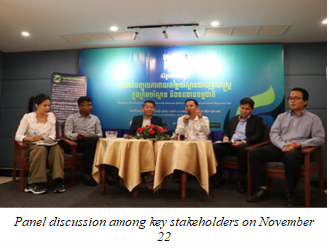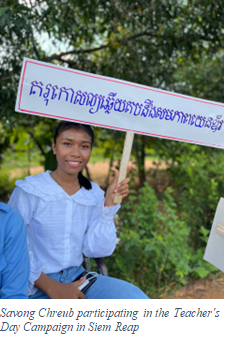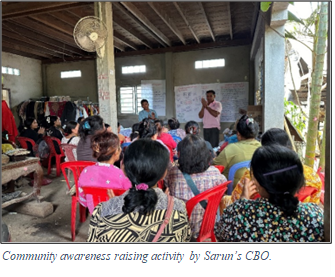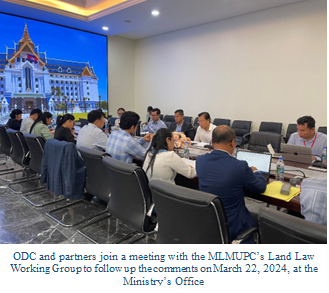In 2023, the Royal Government of Cambodia (RGC) took a significant step towards environmental stewardship by officially endorsing the Environment and Natural Resources Code (ENR Code). This landmark decision incorporated the implementation of the Strategic Environmental Assessment (SEA) as a pivotal element in driving development. Recognizing the significance of this initiative, ODC committed itself to actively supporting the enforcement, dissemination, and monitoring of SEA progress.

As part of this commitment, on November 22, ODC, with support from USAID through FHI 360, organized a highly impactful workshop/dialogue to discuss the implementation of SEA. This event brought together key stakeholders, including the Ministry of Environment’s Department of EIA and the National Council for Sustainable Development (NCSD), as well as representatives from the Ministry of Planning, the Ministry of Tourism, an EIA consultancy firm, and ClientEarth. The participation extended to over 50 Civil Society Organizations (CSOs), Community-Based Organizations (CBOs), journalists, and indigenous representatives from various provinces, all working collaboratively towards sustainable development and inclusivity.
The success of the project implementation is evident in the positive shift observed in the behavior of relevant ministries. The increased responsiveness and active participation of these ministries showcase the tangible impact of the project. This success not only marks a significant milestone in advancing SEA implementation but also underscores the project’s contribution to fostering positive changes within governmental entities, fostering a more collaborative and participatory approach to sustainable national development.
Similar Stories
Empowering education: A journey to promote gender-responsiveness in teaching through public campaigns
Coming from a lower-middle income family residing in a small village in northwest part of Cambodia, Siem Reap, 25-year old Savong Chreub is now a sophomore attending a university in her hometown. She is one of the two members in the family who is pursuing higher education. Having the opportunity for higher education is not common among low-income families who struggle to make ends meet, where girls will be mostly to be pulled out from school to help the family earn a living. Chreub is a bright and enthusiastic young woman. Not only is she dedicated to her studies, but she also volunteers passionately for the NGO. As the second child in her family to pursue higher education, Chreub is determined to break the barriers that hold back many in her community. Despite being one of five siblings, she is determined to pave her own path and achieve her dreams. Her journey towards becoming an Education Champion, youth-led social media advocator, began at a Siem Reap Education Support Team (SEST) quarterly meeting where the discussion centered on education issues, particularly focusing on teaching methods. It was there that Chreub\'s eyes were opened to the concept of gender responsiveness in teaching. She couldn\'t help but reflect on the shortcomings she had observed in the education system. Gender responsiveness was lacking in the teaching methods and there clearly were inequalities within the classroom. \"When I was in high school, a teacher mocked me for not performing well in the classroom. I acknowledge that I may not be the smartest learner. However, instead of making fun of me in front of the class, she should have given more support and attention to me in her lessons,\" she expressed. She emphasized that \"teachers should try to understand the needs and support students without judgement regardless of gender, background, race, or capability.\" Additionally, she observed her classmates have been called mean names based on their sexual orientations or class performance. Chreub joined the NGO Education Partnership (NEP) as an Education Champion, leveraging social media to advocate for gender responsiveness in teaching and learning. Despite facing initial difficulties due to her limited knowledge beyond personal experience, she dedicated hours to learning from education policies, strategic plans, research papers, and reports. She knew that to effectively advocate for change, she needed to have a strong understanding of the issues at hand. For three months straight, Chreub actively created content on social media, raising awareness about the importance of gender-responsive teaching. Her passion and commitment led her to actively participate in discussions with SEST members during quarterly meetings and other educational events. Chreub acknowledged that the issue might not be fully addressed yet, but her efforts haven\'t gone unnoticed. Teachers and friends began to pay attention. They engaged with her social media campaign, seeking to learn more about gender-responsive teaching. Additionally, Chreub finds joy in echoing the concerns surrounding this issue. She believes it has a profound impact on students, constraining their ability to unlock their full potential. As part of its main objectives of building up education stakeholders’ capacity in advocacy efforts, the youth engagement activity that Chreub has enthusiastically led has incorporated more perspectives of gender related issues in education and how youth could start taking part in tackling challenges that affect them. NEP\'s implementation of \"Promoting access to quality and inclusive education for all through public advocacy campaigns\" encourages youth like Chreub to advocate for change in education, promoting equality and quality education for all. Chreub\'s journey exemplifies the power of a single voice in initiating conversations and driving positive change in the area of education.
Shifting attitudes towards sexual harassment
Mr. Oeun Sarun is a 71-year-old CBO leader in Thmey village, Bansay Treng commune, Thmor Kol district, Battambang province. He leads a CBO called “Sahakum Morodak Phum Thmey,” which was selected as one of the cluster members in the Together for Gender Justice (T4GJ) project in October 2022. Mr. Oeun Sarun is a 71-year-old CBO leader in Thmey village, Bansay Treng commune, Thmor Kol district, Battambang province. He leads a CBO called “Sahakum Morodak Phum Thmey,” which was selected as one of the cluster members in the Together for Gender Justice (T4GJ) project in October 2022. Similar to other CBO leaders participating in the T4GJ project, Mr. Sarun facilitated community meetings to share knowledge and understanding of sexual harassment so that participants can further spread the knowledge to the family and neighbors. In his own time, he also continuously disseminated his knowledge to his neighbors and friends as well. He observed that his family and community gradually changed their thinking on sexual harassment, by reflecting on what they did in the past and how they can prevent it now and in the future.
The more the merrier: Incorporating inputs into the draft land law
The ODC\'s Civil Society Support Activity: Cluster Anchor Grant initiative demonstrates the value of collaborative advocacy and strategic participation in achieving legislative reforms that benefit society. ODC\'s path, which focuses on promoting meaningful engagement in natural resource management and building social inclusion, shows devotion, determination, and effective action. Our effort ensures that the voices of communities, Community-Based Organizations (CBOs), and Civil Society Organizations (CSOs) are not only heard but also integrated into the drafting process of the Land Law, which governs land rights and management in Cambodia. In January 2024, ODC began the process by formally requesting the draft Land Law from the Ministry of Land Management, Urban Planning, and Construction (MLMUPC), paving the way for collaborative involvement. When ODC received the draft Land Law in February 2024, its team immediately began mobilizing efforts. ODC organized coordinated events and dialogues to promote extensive consultations and discussions, involving stakeholders at both the sub-national and national levels. Working with legal experts, ODC ensured that the complexity of the legislation was clarified, allowing for involvement and informed input from the grassroots to the national level. ODC\'s collaborative efforts paid off, as we had inputs that reflected diverse viewpoints. With 60 pages of the matrix comments, ODC submitted its inputs to the Ministry within a tight timeframe (February 16), demonstrating its commitment to constructive participation and lobbying. Beyond the submission, ODC realized the value of ongoing communication and advocacy. Addressing gender equality in land ownership and encouraging continuous talks among CSOs, ODC highlighted concerns and options for future engagement with the Ministry. ODC\'s proactive approach resulted in a follow-up meeting request, indicating its commitment to ensure that ODC\'s inputs are not just recognized but also included in the legislative process. “Thank you! I appreciate the inputs and comments from the CSOs on the Draft Land Law. If the government asks the consultant to do it, it might take a million dollars to do so”, H.E. THENG Chan-Sangvar, Secretary of State and MLMUPC’s Land Law Working Group. The impact of ODC\'s combined efforts was clear when the Ministry acknowledged and integrated more than 15 points from ODC\'s submission, indicating a significant step toward inclusive policymaking. While ODC\'s efforts are not always directly acknowledged, the realization of their combined impact emphasizes the significance of ongoing lobbying and collaborative participation. Contributing to the new draft Land Law, ODC remain committed to working for communities\' rights and interests. Armed with knowledge, unity, and a common vision for a more fair and equitable society, ODC are prepared to face the challenges ahead, confident in its power to affect significant change through collective action.


